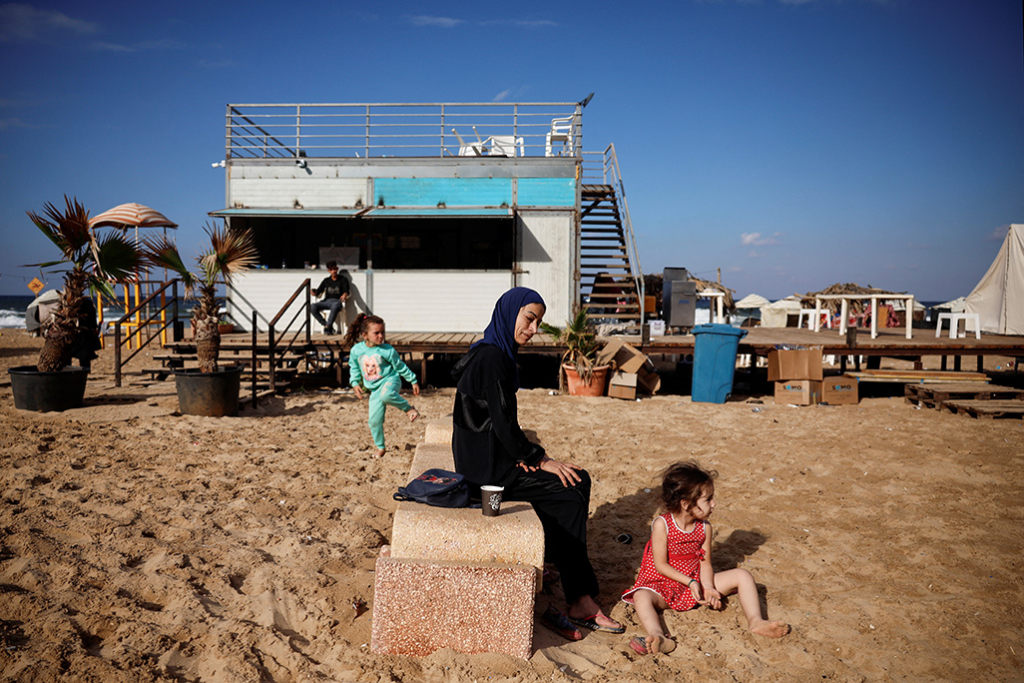Lebanon is facing a severe humanitarian crisis as conflict escalates, leading to widespread displacement and overwhelming pressure on the already limited shelter resources.
Most of the nearly 900 government-established collective shelters in Lebanon are now full, forcing many families to seek refuge in public spaces.
This alarming situation has prompted UN officials to express deep concern over the increasing number of people sleeping on the streets, in public parks, and even on beaches.
Rising Displacement and Overcrowding in Lebanon
The ongoing conflict in Lebanon, particularly the resurgence of hostilities between Israel and Hezbollah, has led to a staggering displacement crisis.
With over 1.2 million Lebanese people displaced and nearly 2,000 lives lost since the beginning of the renewed conflict, the situation is dire. Many families are fleeing their homes, desperately seeking safety and shelter from the escalating violence.
Read : Lebanon PM Agrees to Implement 2006 Deal to End the War with Israel
The UN refugee agency has reported that the shelters in Lebanon are unable to accommodate the sheer number of displaced individuals, leaving many vulnerable and exposed to the elements.
In the wake of this crisis, officials from the UN refugee agency, including Rula Amin, have stated that local authorities are working tirelessly to identify additional sites for shelter.
While some hotels and even nightclubs in Beirut have opened their doors to those in need, these solutions are temporary and insufficient.
The current shelter situation in Lebanon is particularly alarming, as many facilities, including schools, have reached their capacity. This has disrupted education for countless children and young adults who are already facing immense challenges.
As families flee conflict zones, they are not only leaving behind their homes but also their livelihoods. The psychological toll of this displacement cannot be overstated.

Many individuals and families arrive at shelters with profound emotional and physical exhaustion, necessitating extensive support and assistance. The combination of trauma, uncertainty, and limited resources poses a significant threat to the well-being of displaced individuals in Lebanon.
Abandoned Workers and Vulnerable Populations
In addition to the general population affected by the displacement crisis, there is a pressing concern for the tens of thousands of live-in domestic workers in Lebanon.
Many of these individuals, primarily from countries such as Egypt, Sudan, and Sri Lanka, are now facing abandonment by their employers due to the ongoing conflict. Without proper documentation, these workers are hesitant to seek humanitarian assistance for fear of arrest or deportation.
The situation for these workers is precarious, as they often lack the necessary legal status to access vital resources. Many are isolated and unable to communicate effectively with local authorities or aid organizations due to language barriers.
As a result, they remain at significant risk during this humanitarian crisis, further compounding the challenges faced by the broader displaced population in Lebanon.
The UN officials have highlighted the need for targeted assistance for these vulnerable groups, emphasizing the importance of ensuring their safety and well-being during this tumultuous period. Without immediate support and resources, the long-term impacts of this crisis could have devastating effects on both the individual and societal levels in Lebanon.
Challenges of Accessibility and Cross-Border Movement
As the situation in Lebanon continues to deteriorate, accessibility remains a significant issue for those seeking refuge. Israeli strikes have recently sealed off Lebanon’s main border crossing with Syria, preventing many individuals from escaping the conflict. The UNHCR has reported that while some people are managing to cross on foot, the journey is fraught with danger and uncertainty.
Many families are making the desperate decision to flee Lebanon despite the risks involved. Around 60% of the more than 185,000 individuals who have arrived in Syria thus far are children and adolescents, often separated from their parents during their escape.

This highlights the urgent need for comprehensive support systems to address the unique challenges faced by these vulnerable populations. As families navigate the dangerous landscape of conflict, they arrive in neighboring countries with profound needs for support.
The international community must rally together to provide essential resources, including shelter, food, medical assistance, and emotional support, to those affected by the displacement crisis. Without immediate action, the humanitarian situation in Lebanon will continue to worsen, placing even more lives at risk.
In conclusion, the displacement crisis in Lebanon is a multifaceted challenge that requires urgent attention and action from both local authorities and the international community. The overwhelming number of individuals seeking shelter amid the ongoing conflict underscores the need for expanded resources and support systems.
As Lebanon grapples with this humanitarian crisis, it is crucial to prioritize the safety and well-being of all displaced individuals, ensuring that their needs are met during this challenging time.
Lebanon’s humanitarian crisis demands immediate and concerted efforts to provide support for the displaced population, particularly vulnerable groups such as domestic workers and children.
The road ahead may be challenging, but with collective action and support, there is hope for a brighter future for the people of Lebanon.

